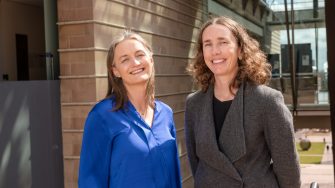Two key water research appointments at UNSW continue the vision
UNSW Engineering’s tradition of visionary planning for the future continues with the recent appointment of two leading researchers as new directors of major water research centres.
UNSW Engineering’s tradition of visionary planning for the future continues with the recent appointment of two leading researchers as new directors of major water research centres.

UNSW Scientia Associate Professor Fiona Johnson has been appointed as Director of the UNSW Water Research Centre (WRC), and Associate Professor and ARC Future Fellow Kristen Splinter has been appointed as the Managing Director of the Water Research Laboratory (WRL).
Johnson and Splinter are now at the helm of two legendary Australian water research organisations – powerhouses of creative problem-solving teams, with international reputations for their expertise in an immense variety of disciplines.
Both WRC and WRL are based within the School of Civil & Environmental Engineering, and both continuously seek and build connections across a wide range of industry and government organisations.
A/Prof Fiona Johnson is a water resources engineer whose research focuses on flooding and extreme events and the use of global climate models for climate change assessments of water resources systems.
She has over twenty years' experience in hydrology working as a consultant, for government and in academia. She is passionate about water quality, and water equality, and is currently undertaking research projects in the Pacific and Australia.
A/Prof Johnson’s vision for the WRC is focused on improving and strengthening connections, supporting people within the organisation and welcoming engagement and relationships with industry and other water stakeholders.
This involves strengthening WRC’s own community – ensuring there are solid support structures for PhD candidates and Early Career Researchers. Focal areas will include mental health, celebrating the cultural diversity of WRC researchers, and a strong focus on a safe workplace.
Alongside the work of building and supporting the community within WRC, Johnson has plans also for increased strategic industry engagement, with a whole-of-centre industry engagement strategy able to showcase WRC’s collective strengths.
The WRC began its work in 1987 with an initial focus on water and wastewater technologies, but has continued to expand beyond water quality and treatment processes to include such areas as lifecycle assessment, atmospheric emissions and odours, humanitarian engineering, and water resources research including blue-green urban water systems. The WRC excels in research that addresses water sustainability, particularly in the face of climate change challenges.
WRC already contributes to Global Water Institute (GWI) research projects including Pacific focused projects, and engagement with the Yuwaya Ngarra-li, the community-led partnership between the Dharriwaa Elders Group and UNSW.
Fiona Johnson is seeking to continue and increase such collaborations with other research centres around UNSW where there are synergies with WRC academics and researchers.
A/Prof Kristen Splinter is a coastal engineer with over twenty years of applied and fundamental research experience in the fields of coastal processes and hazards. Her research uses physical and numerical modelling as well as field data collection to better understand coastal processes.
Her ARC Future Fellowship aims to generate new knowledge in coastal processes to develop new regional shoreline change models and deliver unprecedented new shoreline data. With a strong desire to support and encourage more women into the discipline, Kristen is an advocate for better gender equity within academia and engineering.
A/Prof. Splinter sees her appointment as “a very humbling opportunity to help foster this great team of both academics and professional engineers and lead us to even bigger and better things.” She is very much looking forward to building and strengthening the links between WRC and WRL in her new role to drive new industry relevant innovations and industry funded research programs.
“As we continue to face the challenges associated with climate change”, she says, “I want to see WRL as an Australian leader in innovative water related design.”
As Kristen steps away from her role as Chair of the Faculty of Engineering Staff Gender Equity and Diversity Working Group, she plans to continue to foster a people centred work environment and to find more ways to support an inclusive research culture at WRL, with particular focus on the ECA/ECRs on site.
“WRL is a family and we all have important roles to play in its success”.
She also wants to focus on improving our links and support within the Pacific Region and align our work with the UN Sustainable Goals.
She says: “We have such capacity to improve the lives of our neighbours, through both educational opportunities and culturally relevant and eco-friendly design options for things like coastal protection, and safe water.”
Beyond the research, Splinter has plans to also increase our impact in the education space by developing more industry driven micro-credentials through the AGSE.
“WRL already runs a Coastal Engineering short course, but there is opportunity for more. Australia and NZ currently lack, for example, a solid technical master’s degree in coastal engineering,” she says.
“I’d love for us to develop a suite of offerings to be able to be like the UN IHE Delft Institute for Water Education and support local (Asia-Pacific) students to bring much needed skills back home.”
Founded in 1959, UNSW’s Water Research Laboratory based in Manly Vale spans four hectares and is home to state-of-the-art facilities and equipment with staff working in the disciplines of coastal engineering, engineering hydraulics, estuarine engineering and wetland restoration, groundwater, river flow, floodplain management & catchment hydrology, offshore renewable energy, and climate change adaptation.
WRL is one of UNSW’s great success stories, its founding research team responsible for carving out new methods and building new data suitable for understanding the unique character of the Australian continent. WRL academic staff played a major role in the establishment of the first environmental engineering degree in Australia in the early 1990s, and over the course of 60 years, the Laboratory has continued to respond with fresh insights and creative solutions to the problems facing the Australian water industry.